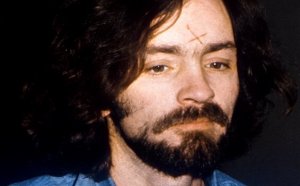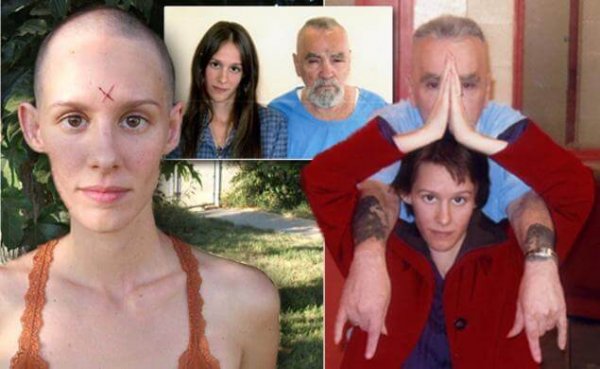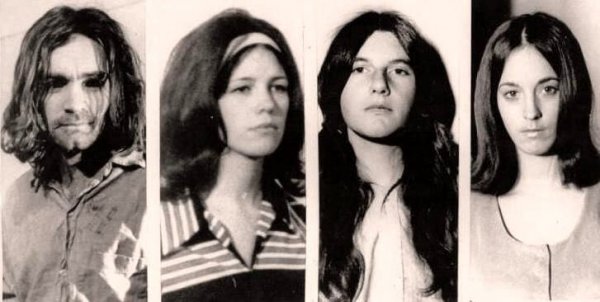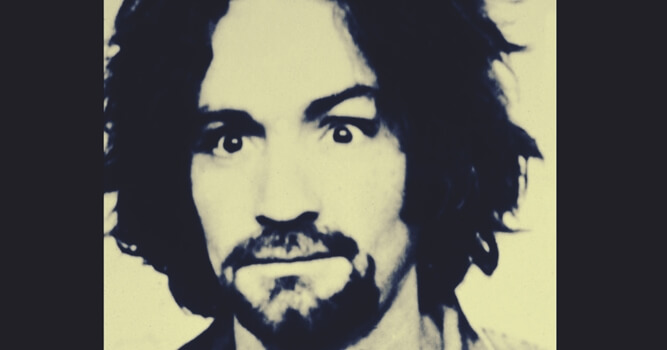Charles Manson and the Psychology Behind His Evil Cult


Written and verified by the psychologist Valeria Sabater
After the widely viewed trials in the early 70’s, the psychologists, psychiatrists, and journalists covering the case realized something. Manson had a special ability to create a kind of psychological fascination, which he used to get his students to kill for him. It’s also what helped him create his circle of devoted followers.
We don’t even have to go very far back. In 2014 Charles Manson managed to get a license to marry while he was serving his life sentence. His girlfriend was Afton Burton, a 26 year-old woman who he had been corresponding with ever since she was 16.
Even though the wedding never happened, there were pictures of the two of them. They showed quite a transformation in Afton. She wanted to look more like her idol, so she shaved her head and tattooed the famous cross on her forehead.
This fact, the circumstances of the murders, and Manson’s entire mysterious, massive cult got a second life after his death. The ripples keep expanding and a lot of darkness has yet to see the light of day.
There’s one thing that comes up over and over again throughout the history of criminology: evil attracts. Murder seduces. One thing that’s even clearer: big murderers or cult figures like Manson still sell. They still inspire books and scripts for shows and movies.

Charles Manson’s personality
One thing criminologists agree on is that there are still a lot of mistaken ideas about Manson. His face comes to most of our minds when we think of serial killers. But there are two much better examples of serial killers; they just aren’t as famous. We’re talking about Ted Bundy and John Wayne Gacy, the “Killer Clown.”
Was he really a serial killer?
Charles Manson wasn’t a serial killer. No one ever even classified him as one. From a psychological point of view, “The Family” case is definitely one of the most fascinating ever, and there are a few reasons for it. Manson encouraged, convinced, and manipulated his disciples into committing murders based on a very specific, secret code called “Helter Skelter.”
He actually took that term from the title of a Beatles song. The song was about hardships in love, but for him it went beyond that. It was justification for an apocalyptic racial war. It was his obsession and his inspiration. The crimes all took place over two nights. In other words, it wasn’t an impulse and had nothing to do with any kind of temporary insanity.
Manson had planned it out, and even more interesting for the experts, he got his disciples to commit even more murders afterwards. He didn’t let them think much about what they’d done. His powers of persuasion and manipulation were perfect and absolute. He put them into a state of total emotional coldness.

What exactly was he?
Later on, once he was in prison, people constantly tried to understand the psychology of Manson’s personality. It’s worth mentioning that there was never any clear, objective diagnosis of any disorder. But one thing a lot of analysts agreed on being fundamental in his personality were frustration and conflict.
An abusive childhood, poverty, and complete neglect by social services pushed him to crime in order to survive. Rebellion and disregard for authority were two constants in his life. Later on came megalomania, his psychopathic personality, and major anxiety disorder.
Why people were attracted to Charles Manson’s cult
Sheila Isenberg was one of the first psychiatrists to find any reasons that might justify fascination around a person as dark as Charles Manson. By the way, he actually referred to himself as the “Devil man.” Dr. Isenberg proposed a few different psychological theories in her book, Women Who Love Men Who Kill. Here they are…
People with low self-esteem
The first explanation talks about “hyper-empathy syndrome.” It is seen in women who have very low self-esteem. They have a tendency to connect with important or famous people who give them a sense of worth.
In this case, bonding with a known murderer who has made an impact on society is a way of filling up their emptiness. It helps them feel more self-assured and more important. So here it’s their excess empathy that enables them to connect deeply with the person. It may even get the point that they justify the murderer’s evil actions.
The “Homicidol” effect
The “homicidol” effect comes from two words: “homicide” + “idol.” It certainly fits Charles Manson, along with Jack the Ripper, Hannibal Lecter, etc. Sometimes people feel a huge attraction or admiration for people (real or fictitious) who are known for being extremely violent. Instead of rejecting them, they turn them into idols worthy of worship.
This phenomenon, according to psychiatrists Micael Dahlén and Magnus Söderlund, is seen most often in successful women. They’re usually well-educated and from a higher social status. But we should also point out that it’s very common in our society overall. Just think of how much Charles Manson inspired musicians like Guns N’ Roses and Marilyn Manson.

“Hybristophilia”
Hybristophilia is a forensic psychology term for being attracted (both mentally and sexually) to “dangerous” people. It is abnormal, not at all common, and even less rational. It falls into the category of paraphilias.
Lastly, if there’s one thing we can say for sure, it’s that the idea of Charles Manson will remain in our social, criminological, and cultural spheres for a long time to come. In fact, even now the name “Charles Manson” still brings in money and people take advantage of that fact. It doesn’t seem too hard: not long ago Quentin Tarantino talked about making a movie, and there are new books about him coming out too.
After the widely viewed trials in the early 70’s, the psychologists, psychiatrists, and journalists covering the case realized something. Manson had a special ability to create a kind of psychological fascination, which he used to get his students to kill for him. It’s also what helped him create his circle of devoted followers.
We don’t even have to go very far back. In 2014 Charles Manson managed to get a license to marry while he was serving his life sentence. His girlfriend was Afton Burton, a 26 year-old woman who he had been corresponding with ever since she was 16.
Even though the wedding never happened, there were pictures of the two of them. They showed quite a transformation in Afton. She wanted to look more like her idol, so she shaved her head and tattooed the famous cross on her forehead.
This fact, the circumstances of the murders, and Manson’s entire mysterious, massive cult got a second life after his death. The ripples keep expanding and a lot of darkness has yet to see the light of day.
There’s one thing that comes up over and over again throughout the history of criminology: evil attracts. Murder seduces. One thing that’s even clearer: big murderers or cult figures like Manson still sell. They still inspire books and scripts for shows and movies.

Charles Manson’s personality
One thing criminologists agree on is that there are still a lot of mistaken ideas about Manson. His face comes to most of our minds when we think of serial killers. But there are two much better examples of serial killers; they just aren’t as famous. We’re talking about Ted Bundy and John Wayne Gacy, the “Killer Clown.”
Was he really a serial killer?
Charles Manson wasn’t a serial killer. No one ever even classified him as one. From a psychological point of view, “The Family” case is definitely one of the most fascinating ever, and there are a few reasons for it. Manson encouraged, convinced, and manipulated his disciples into committing murders based on a very specific, secret code called “Helter Skelter.”
He actually took that term from the title of a Beatles song. The song was about hardships in love, but for him it went beyond that. It was justification for an apocalyptic racial war. It was his obsession and his inspiration. The crimes all took place over two nights. In other words, it wasn’t an impulse and had nothing to do with any kind of temporary insanity.
Manson had planned it out, and even more interesting for the experts, he got his disciples to commit even more murders afterwards. He didn’t let them think much about what they’d done. His powers of persuasion and manipulation were perfect and absolute. He put them into a state of total emotional coldness.

What exactly was he?
Later on, once he was in prison, people constantly tried to understand the psychology of Manson’s personality. It’s worth mentioning that there was never any clear, objective diagnosis of any disorder. But one thing a lot of analysts agreed on being fundamental in his personality were frustration and conflict.
An abusive childhood, poverty, and complete neglect by social services pushed him to crime in order to survive. Rebellion and disregard for authority were two constants in his life. Later on came megalomania, his psychopathic personality, and major anxiety disorder.
Why people were attracted to Charles Manson’s cult
Sheila Isenberg was one of the first psychiatrists to find any reasons that might justify fascination around a person as dark as Charles Manson. By the way, he actually referred to himself as the “Devil man.” Dr. Isenberg proposed a few different psychological theories in her book, Women Who Love Men Who Kill. Here they are…
People with low self-esteem
The first explanation talks about “hyper-empathy syndrome.” It is seen in women who have very low self-esteem. They have a tendency to connect with important or famous people who give them a sense of worth.
In this case, bonding with a known murderer who has made an impact on society is a way of filling up their emptiness. It helps them feel more self-assured and more important. So here it’s their excess empathy that enables them to connect deeply with the person. It may even get the point that they justify the murderer’s evil actions.
The “Homicidol” effect
The “homicidol” effect comes from two words: “homicide” + “idol.” It certainly fits Charles Manson, along with Jack the Ripper, Hannibal Lecter, etc. Sometimes people feel a huge attraction or admiration for people (real or fictitious) who are known for being extremely violent. Instead of rejecting them, they turn them into idols worthy of worship.
This phenomenon, according to psychiatrists Micael Dahlén and Magnus Söderlund, is seen most often in successful women. They’re usually well-educated and from a higher social status. But we should also point out that it’s very common in our society overall. Just think of how much Charles Manson inspired musicians like Guns N’ Roses and Marilyn Manson.

“Hybristophilia”
Hybristophilia is a forensic psychology term for being attracted (both mentally and sexually) to “dangerous” people. It is abnormal, not at all common, and even less rational. It falls into the category of paraphilias.
Lastly, if there’s one thing we can say for sure, it’s that the idea of Charles Manson will remain in our social, criminological, and cultural spheres for a long time to come. In fact, even now the name “Charles Manson” still brings in money and people take advantage of that fact. It doesn’t seem too hard: not long ago Quentin Tarantino talked about making a movie, and there are new books about him coming out too.
This text is provided for informational purposes only and does not replace consultation with a professional. If in doubt, consult your specialist.







